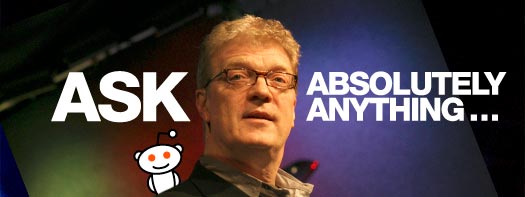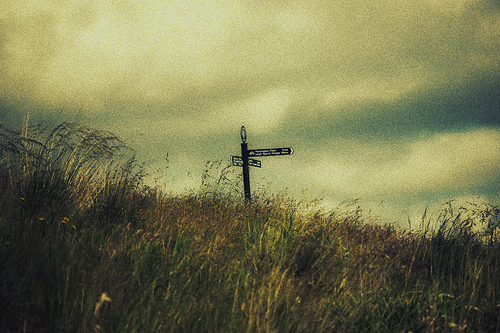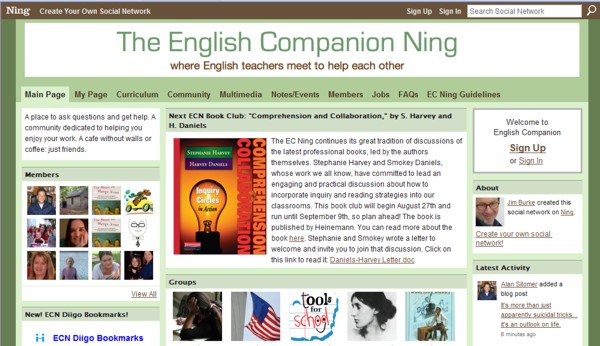
The TED blog describes an interesting Q&A session with creativity expert, Sir Ken Robinson, author of The element. Reddit gave TED fans the opportunity to submit questions for Ken, with the 10 most voted questions being answered.
Here are the 10 questions Ken answered. Many of these are long, and I’ve tried to select the main part of the question, but you’ll have to go to the post to read the rest:
1. What specific actions do you recommend taking to overhaul, say, public education to maximize how we identify and nurture creativity? And what place do you think things like critical thinking and logic (also noticeably absent) have in basic education?
2. …why do we make these distinctions between “math”, “biology”, “history”, and “art”, when they are all linked, and when the interconnections so often make them meaningful? Is it OK if children are not “well-rounded,” as long as they are following their curiosities, or does a lack of “well-roundedness” mean we are not exposing them to enough bridges to new interests?
3. What do you think is the correct way to grade/rank/assess an individual’s academic performance? And what do you think should & should not be included in standardized entrance exams like SAT?
4. … some would advocate that video games are in fact best preparing kids for 21st century life. What’s your opinion on this, and of the place of video games in education?
5. There are so many individual teachers and librarians out there who GET IT, who want to help their students stop “playing school” and start having authentic learning experiences. How do they build critical mass to change our bureaucratic, cookie-cutter approach to educating children?
6. How do I get involved to make this change happen?
7. … What are your thoughts on the future of distance learning, and have you seen any signs of a breakthrough that will replace the status quo, while delivering interactive, powerful, social and visually simulating learning?
8. What is your opinion of the Summerhill School?
9. I’m a maths teacher, in England, in a forward-thinking school (the head showed your TED talk to the whole school a couple of years ago at a staff meeting) and I believe in what you say about creativity passionately. So what three things should I do in September to foster creativity? I’m talking about definite, in-the-one-hour-lesson things I can do to my classes to change their experience.
10. … We all know you can find your element at any time in life but what more can I do to find out what MY element is?
It’s definitely worth reading in full. I won’t summarise but I’ll pull out sections which resonated with me.
The basis of my argument is: creativity isn’t a specific activity; it’s a quality of things we do. You can be creative in anything — in math, science, engineering, philosophy — as much as you can in music or in painting or in dance. And you can certainly be involved in the arts in ways that are especially creative. And so it’s important to emphasize that it’s not about creating some small space in schools where people can be creative, and particularly not if that means just tacking on some art programs on a Friday afternoon. It’s about the way we do things.
Ken talks about a ‘grammar of creativity’:
You can help them think productively, generate ideas effectively, help them to think of alternative approaches to issues and questions.
It’s a series of processes, not an event. And helping people understand how that works is an important part of being creative. You wouldn’t expect people to become literate just by hoping it’d happen.
And I think subjects is a poor idea, really, for the kind of work I’m interested to promote, because it suggests that the world is definable into entirely different sorts of content or subject matter…. So now, we live in an age where there are multiple variations of different disciplines — the merging of physics and chemistry and of engineering and genetics. And the problem is that schools and institutions are often slow to keep up with these changes.
It’s not that I am against standardized testing. What I’ve personally got a rant about is the extent to which standardized testing, firstly, has become a massive commercial industry which is detached, in most cases, from the real purpose of education. And secondly, the extent to which we’ve come to associate standardizing with raising standards. Now, everybody agrees we should raise standards in schools. Of course you should. But, the primary instrument that’s being used is standardized testing. And the problem with it is that it fails to do the one thing we know works if we want to improve standards in schools, which is to address personal development… It’s not there to identify what individuals can do. It’s there to look at things to which they conform.
So, my argument is that instead of standardizing everything in schools we should be going in the opposite direction…. I think we should be personalizing everything in schools. We should be looking at ways of making education relevant to each individual child. And there’s no other way of improving standards. Actually, there’s no other way of doing it on the grand scale.
On the whole, people in education get this as much as anyone else. And they don’t like it. They know there’s a big problem in the system, and they want to change it….
The real place to focus, initially, is on the work you do yourself. I’m always keen to say this: Education doesn’t happen in the committee rooms of Washington, or London, or Paris or Berlin. It doesn’t happen in government buildings. It happens in the minds of students and learners. It happens in the classroom… So what I would say to teachers is: Change your own practice, today. The education your children are getting is a result of what you’re doing with them.
Don’t wait for the government to change things; get on and do it yourself. But also, if you’re in a position to do it, you should try and influence policy. There’s an opportunity to do that in many countries. It depends on your position.
Just dumping stuff online isn’t the answer to it. But there’s a massive thirst for ideas, for this sort of content, as illustrated by the mushrooming of social networking and user-generated content… Because we now have the ability to put the best thinking, materials, pedagogy, resources in front of everybody. This should be seen by schools as a massive opportunity to — not to replace what they do, not to replace their own teachers and curriculum, but to enrich and enhance it.
But there are some characteristics of good teaching which are concerned with promoting creativity. One of them is to engage children’s curiosity to get their imaginations fired up. I was saying earlier that the fundamental capacity is imagination. Well, what I mean by that is you can’t be creative if your imagination is not engaged.
If you want to promote creativity, you need, firstly, to stimulate kids minds with puzzles and questions which will intrigue them. Often that’s best done by giving them problems, rather than just solutions. What often happens in classrooms is, kids sit there trying to learn in a drone-like way things of not much interest that have already been figured out.
I talked about, in the All Our Futures report, two things, one of which was “teaching creatively”: teachers finding interesting ways into material. Presenting unusual points of entry or interesting angles or perspectives, and enjoying the process of finding them. So, that’s important. Teachers themselves should try to evolve their own creative capacities and enjoy what they do, creatively. Standardized testing has taken the joy of teaching away from them.
The second big part of this is asking open questions as much as we ask closed questions. Giving people questions they can explore, rather than ones to which they have to find answers that have already been given. That, to me, is the fundamental piece of all creative processes. Giving area for exploration.
One thing I didn’t touch on earlier is, the creative process is a bit like a DNA strand. There are a lot of things weaving through it. One task being creative is to hypothesize and think of possibilities and look at alternatives ideas — to speculate. To be imaginative. But an equally important part for every creative process is to act critically on the ideas you’re coming up with. To evaluate them.
… group work. An awful lot of creative work doesn’t happen individually. It happens with people interacting with other people. The most powerful engines of creative thinking are groups. And the reason that’s true is because a great group models the human mind: it’s diverse, it’s dynamic, it’s distinctive. So, knowing how to form groups, how to get groups to work, how long to leave them doing it is a core skill of good teachers.
So I think its three things: it’s stimulating imagination, it’s telling them problems with open questions, and knowing how to organize groups. And I think in there are the answers to things we can all start doing tomorrow.
Fertile ground for personal and professional discussion, don’t you think?




